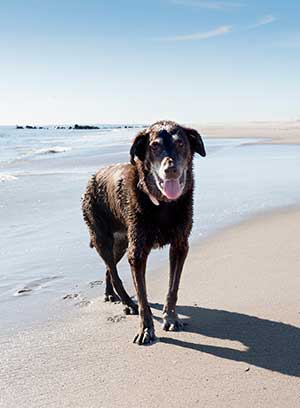Osteoarthritis, often referred to as degenerative joint disease, is a progressive condition characterized by the deterioration of joint cartilage and the underlying bone. IN dogs, it commonly affects weight-bearing joints such as the hips, elbows, knees and spine. While osteoarthritis can develop due to factors such as genetics or joint abnormalities, it most frequently arises from wear and tear on the joints over time.
Signs of Osteoarthriits in Dogs
 Recognizing the signs of osteoarthritis in dogs is important for early intervention and management. Common symptoms include:
Recognizing the signs of osteoarthritis in dogs is important for early intervention and management. Common symptoms include:
- Limping or favoring certain limbs: Dogs with osteoarthritis may exhibit lameness or difficulty bearing weight on affected limbs
- Stiffness and reluctance to move: Arthritic dogs may be hesitant to engage in physical activities they once enjoyed such as running or playing fetch.
- Decreased activity levels: A noticeable decrease in energy or reluctance to participate in exercise can be a sign of joint discomfort.
- Visible signs of pain: Dogs may display signs of discomfort, such as whimpering, panting, or licking at affected joints.
- Changes in behavior: Some dogs by be more irritable or withdrawn due to chronic pain with osteoarthritis.
Dogs are masters of masking pain, so subtle changes in behavior or activity level should not be overlooked.
Diagnosing Osteoarthritis In Dogs
Diagnosing osteoarthritis in dogs involves a combination of physical examination, medical history review, and diagnostic imaging such as radiographs (X-rays) or joint fluid analysis. Once diagnosed, the goal of treatment is to alleviate pain, improve joint function and slow the disease progression.
Treatment for osteoarthritis includes:
- Weight management: Having a healthy weight decreased the stress on the joints and can help alleviate symptoms.
- Medications: Non-steroidal anti-inflammatory drugs (NSAIDs), pain relievers, and joint supplements containing glucosamine and chondroitin sulfate as well as egg shell membrane are commonly used to manage pain and inflammation. There is also a new injection called Librela labelled for osteoarthritis that is available for osteoarthritic pain. Librela by Zoetis is a once a month injection for controlling osteoarthritic pain by targeting nerve growth factor. Librela was approved by the FDA in January of 2022 however has been used in Europe for more than 2 years with good results. Librella provides an alternative to using NSAID’s as a choice for control of osteoarthritic pain. Librela has only been evaluated in dogs with osteoarthritis of the limb joints and not of the spine. It should not be used in breeding or pregnant and lactating dogs as well. The most common side effect reported has been urinary tract infections, skin infections (bacterial), dermatitis and increased blood urea nitrogen (BUN).
- Physical therapy: Therapeutic exercise, massages, hydrotherapy and acupuncture can help with joint mobility and muscle strength.
- Dietary Supplements: Omega-3 fatty acids and antioxidants may help with anti-inflammatory benefits and support joint health.
- Surgery: In severe cases there are surgical intervention options such as joint replacement or arthroscopy.
Canine osteoarthritis is a common condition that affects dogs of all ages and breeds, significantly impacting mobility and quality of life. Being able to recognize the symptoms, seeking immediate veterinary care and by creating a comprehensive treatment plan dog parents can help with their pet’s pain and improve their overall well-being.
Is Your Senior Dog Struggling With Joint Pain?
Calusa Veterinary Center offers comprehensive osteoarthritis care to help your furry friend live a happier, more comfortable life. Our experienced Boca Raton veterinarians provide personalized treatment plans and advanced veterinary therapies to manage symptoms and improve mobility.
Our full-service veterinary clinic is dedicated to providing exceptional care for senior dogs. Our osteoarthritis management program includes pain relief options, physical therapy, and nutritional guidance to help your pet maintain a good quality of life. Schedule a consultation with our team to discuss your dog's specific needs
